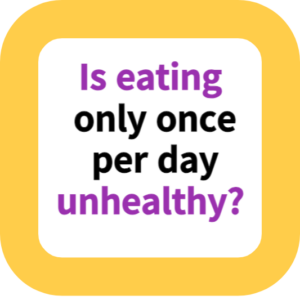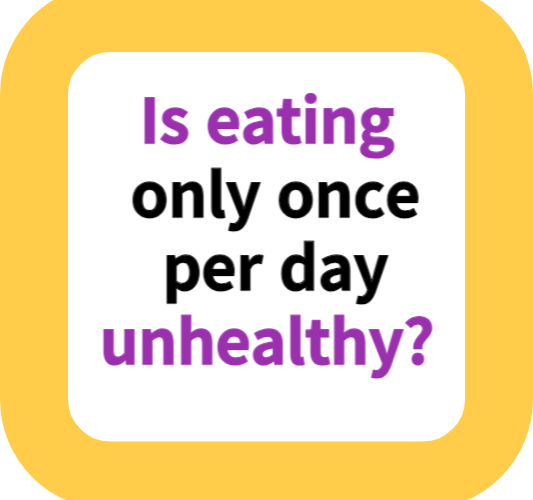s eating only once per day unhealthy?
Welcome to our latest blog post, where we delve into the intriguing world of eating just once per day, a practice often associated with intermittent fasting.
This post offers a comprehensive exploration of this unique dietary pattern, discussing its various aspects from the health benefits and metabolic advantages to personal experiences and scientific research.
Whether you’re curious about the “One Meal a Day” (OMAD) diet, seeking to understand its potential impact on your health and lifestyle, or simply looking for insights into this increasingly popular eating trend, our post provides a balanced and informative perspective.
Join us as we unpack the complexities of this dietary approach, examining why it might be more than just a passing fad and how it could fit into a health-conscious lifestyle.
Is eating only once per day unhealthy?

Introduction
Eating only once per day, a practice often linked with intermittent fasting, has sparked considerable interest and debate in the health and wellness community.
This dietary approach, which entails consuming the entirety of one’s daily caloric intake in a single meal, has been embraced for various reasons, from weight management to simplifying lifestyle choices. Its rising popularity calls for a deeper exploration of its potential health impacts, benefits, and considerations.
Understanding Intermittent Fasting and Its Variants
Intermittent fasting is a dietary pattern characterized by cycles of fasting and eating. Standard methods involve fasting for periods ranging from 12 to 20 hours, followed by a shorter eating window of 4 to 10 hours.
This cycle is not just about abstaining from food; it’s about strategically timing meals to allow the body to enter a fasting state. Within this framework, the “One Meal a Day” (OMAD) diet emerges as an extreme variant, where the fasting period extends to about 22–23 hours, allowing for a single meal each day.
Health and Metabolic Advantages of Fasting
Intermittent fasting, especially when extending beyond 14 hours daily, offers a plethora of health benefits. Key among these are enhanced fat burning and weight loss, as the body shifts from using readily available glucose to stored fat as its primary energy source.
This metabolic switch not only aids in weight management but also improves insulin sensitivity, potentially reducing the risk of type 2 diabetes. Additional benefits include lowered blood pressure, increased brain health through higher levels of BDNF (Brain-Derived Neurotrophic Factor), and even potential roles in cancer prevention and management of neurodegenerative disorders.
The OMAD Diet: A Closer Look
The OMAD diet is gaining traction among diverse groups, from those seeking weight loss to elite athletes optimizing performance. By eating once a day, individuals often report heightened focus and training efficiency.
However, the diet’s success hinges on the nutritional quality of that single meal. It must provide a balance of essential nutrients, as there are no other meals to compensate for dietary deficiencies.
Personal Experiences and Lifestyle Impact
Many individuals have incorporated the OMAD diet into their daily routines for reasons beyond health, such as time management and personal comfort with eating patterns.
This approach can simplify meal planning and reduce the time spent on food preparation and consumption. Personal accounts highlight the flexibility and adaptability of the OMAD diet, aligning it with various lifestyle needs and preferences.
Scientific Research and Dietary Considerations
Research into meal timing and frequency sheds light on their impact on health. Studies have shown that skipping breakfast or eating late can increase the risk of coronary heart disease.
However, eating once a day, particularly in the morning, appears to be a safe practice, potentially aligning with calorie restriction strategies known to extend lifespan. The key is ensuring that the diet does not lead to nutritional imbalances or deficiencies.
Conclusion
The practice of eating once per day, within the context of intermittent fasting, can be a healthy and effective dietary strategy if the meal is nutritionally complete. While it offers numerous benefits and suits various lifestyles, it is not universally appropriate.
Individual health conditions, dietary needs, and personal preferences should guide the choice to adopt this eating pattern. Consulting healthcare professionals for personalized advice is crucial before making significant dietary changes. The OMAD diet, when practiced thoughtfully, can be a meaningful part of a balanced, health-conscious lifestyle.
